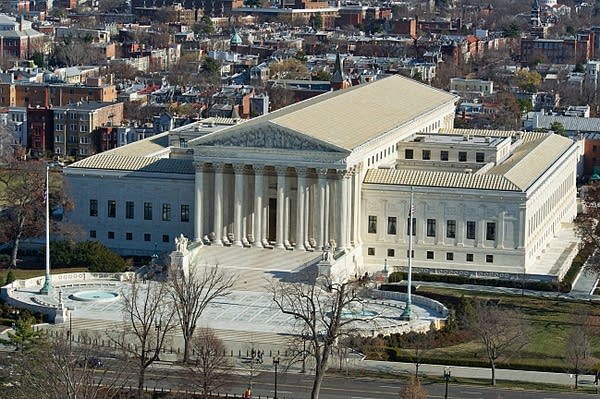Should workers pay their “fair share” if they benefit from collective bargaining?

Go Deeper.
Create an account or log in to save stories.
Like this?
Thanks for liking this story! We have added it to a list of your favorite stories.

Update: Supreme Court rules against public unions on "fair share" fees.
The future of US public-sector labor is in question.
The US Supreme Court is poised to rule on Harris vs. Quinn, and could overturn the requirement that public-sector workers must pay a “fair share” of union dues even if they are not members. "Fair share" workers pay a reduced rate when compared to full union membership, but without them the collective bargaining power of unions would be significantly reduced.
NPR's Nina Totenberg on the case background:
Turn Up Your Support
MPR News helps you turn down the noise and build shared understanding. Turn up your support for this public resource and keep trusted journalism accessible to all.
In Illinois 10 years ago, 28,000 home health workers who care for adults with disabilities approved a union. Since then, hourly wages have nearly doubled, the workers now receive regular training, and they have health insurance. The state says as a result, the workforce has been stabilized and professionalized, and the government has saved money by keeping adults with disabilities in their homes.
Some workers, however, object to paying what is known as "fair share" fees. That is, even though they haven't joined the union, they are required to pay their fair share of the costs of negotiating and administering a union contract they benefit from. The Supreme Court has long allowed such fees to prevent nonmembers from free-riding on union members' dues. But in recent years, some of the court's conservatives have suggested they may be prepared to reverse this long-established principle.
More Totenberg:
On the steps of the court, Susan Watts, whose 27-year-old daughter cannot walk or talk, explained why she objects to paying fair-share fees. She joined the program, benefiting from the wage increases, after the workers were already unionized.
"I really didn't have a vote ... or a voice," she said. "It's mandated for us to pay this fair share, and the money is being taken from my daughter."
Watts believes that if there were no union contract, she might have more money for her daughter's medical care.
But that is not how the state, most of the workers, or most of the clients see it. The state says it actually has saved $632 million by creating a stable workforce to care for adults with disabilities in their homes instead of nursing homes.
Today's Question: Should workers pay their "fair share" if they benefit from collective bargaining?


